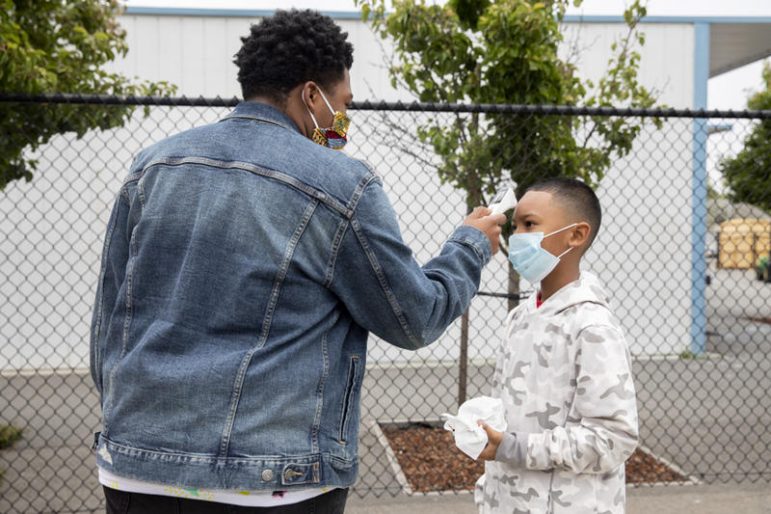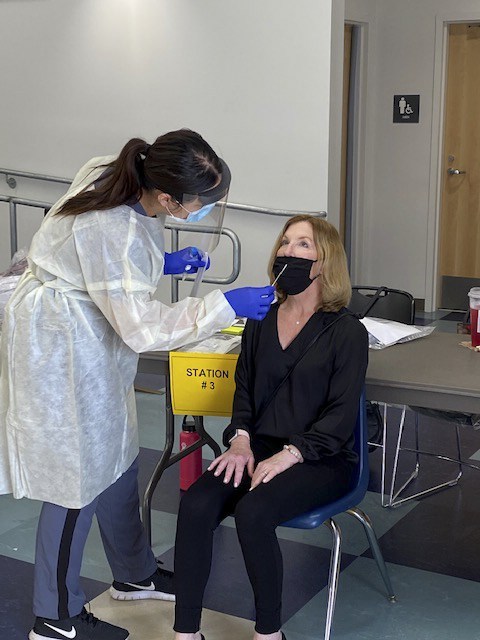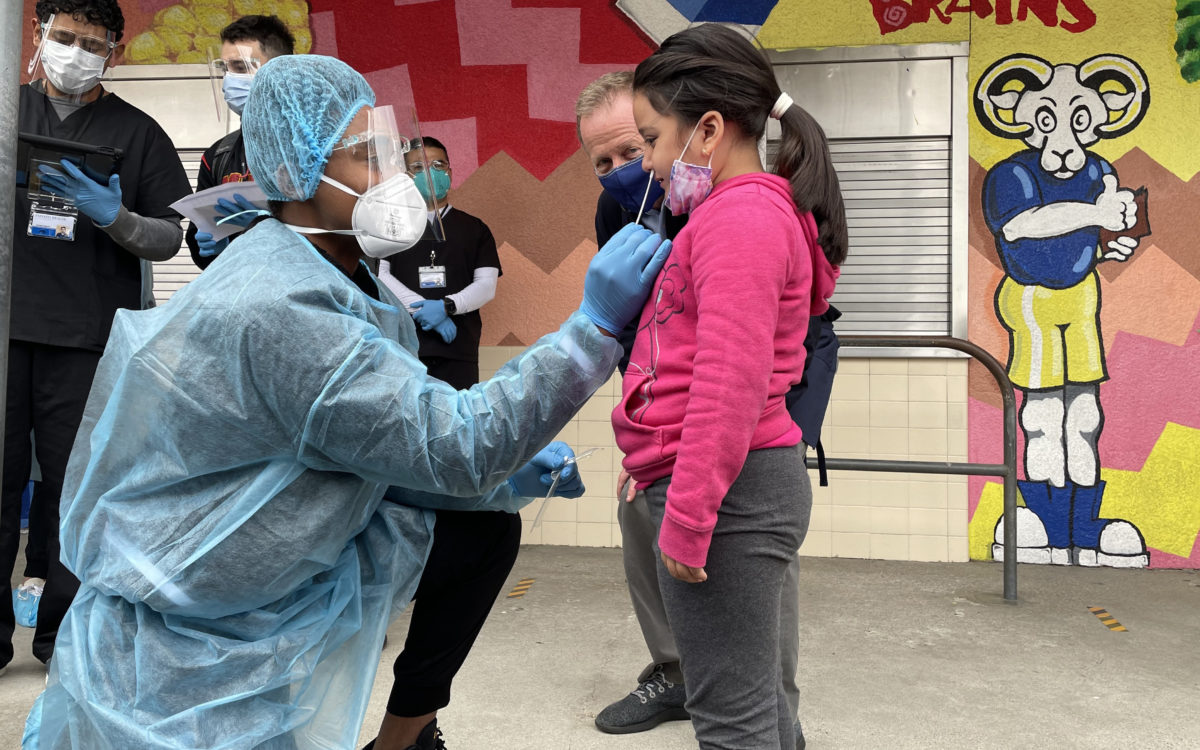As students in California prepare to return to in-person instruction, schools are piecing together COVID testing and vaccination measures that are as varied as the state itself.
The state is urging schools to test students and staff regularly and encourage everyone on campus who’s eligible to get vaccinated. But neither vaccinations nor testing is required, and schools have flexibility as to how they implement measures to prevent COVID outbreaks.
The result is a patchwork of safety plans that are likely to change as conditions evolve. Los Angeles Unified, for example, is testing all students and staff weekly, regardless of whether they’ve been vaccinated. San Francisco Unified, meanwhile, is recommending that students and staff get tested if they have symptoms, but is not requiring tests.
“Testing is an important part of tracking the spread of COVID” said Dr. Robert Schooley, an infectious disease specialist at UC San Diego and co-creator of the university’s COVID safety plan.
“There’s no optimal way for schools to use testing, but we do know that it should be targeted and done frequently enough for school and public health officials to know what’s going on with the school population.”
The rapidly changing safety plans come amid a surge of COVID cases linked to the delta variant, a dramatically more transmissible strain of the original coronavirus that’s now dominant in California. Over the past month, new COVID infections in California grew by more than 400%, with young people leading the surge, according to the California Department of Public Health.
As a result, many California counties have reinstituted indoor mask mandates, even for people who are vaccinated.
Many employers, including California-based companies Google, Apple, Lyft, Uber and Twitter, have delayed plans to bring employees back to the office, according to the New York Times. Disneyland is requiring most of its employees to be vaccinated. On July 26, Gov. Gavin Newsom announced all state employees are required to be vaccinated or face weekly COVID tests.

But for most schools, tests are only one part of a broader safety plan. Vaccinations, social distancing, ventilation, regular cleaning, contact tracing and masking are also important ways to stop the spread of COVID, public health officials said. The only measure that the state requires is masking. Everyone on campus, regardless of whether they’re vaccinated, must wear masks indoors, the state announced last month.
Public health experts predict a jump in COVID cases linked to schools reopening. Although children are less likely than adults to get sick or die from COVID, they’re also less likely to be vaccinated. Vaccines are only available to those age 12 and older, and only 11.5% of 12-to-18-year-olds nationwide have been fully vaccinated, according to the Mayo Clinic.
Children are also at risk of contracting a rare disorder called multisystem inflammatory syndrome, a potentially deadly condition linked to COVID. So far, more than 300 children in California, and 4,196 nationwide, have been diagnosed with MIS-C, according to the Centers for Disease Control and Prevention. At least 37 nationally have died.
Testing in K-12 schools “remains a powerful tool” for preventing transmission of COVID, according to state public health authorities. The state is offering free tests for all public, charter and private schools in California and suggesting schools use one of four testing protocols depending on the infection rate in the community or if there’s an outbreak at school:
- Low community rate: periodic testing of asymptomatic students and staff;
- High community rate: weekly or biweekly testing of everyone who’s unvaccinated;
- Outbreak at school: testing every unvaccinated person who’s been in close contact with someone who’s tested positive;
- Symptomatic individuals: testing anyone who has symptoms of COVID.
Another choice facing schools is the type of test to offer: either polymerase chain reaction, also called a PCR test, or a rapid test. Both are done by inserting a cotton swab in the nose. PCR tests are slightly more accurate but take about 48 hours to produce a result. Rapid tests are less accurate but might be more convenient for schools trying to test large numbers of people, Schooley said.
Vaccination policies are up to each individual district, and in many cases are subject to union approval. Teachers and other school staff are exempt from the state’s vaccination requirement because they’re employees of their districts.
Meanwhile, districts are adopting a variety of testing policies.
Merced City Schools is offering free tests to students and staff but isn’t requiring tests unless there’s been an outbreak. In that case, the district will test anyone who’s been in contact with someone who’s tested positive or has symptoms.
The decision was a collaborative effort between school and local public health authorities, said Sergio Mendez, the district’s director of pupil services.
“We’re feeling very confident in the layers of mitigation we’ve put in. Testing is a big part of it,” Mendez said.

San Bernardino City Schools is assigning “COVID liaisons” to coordinate testing and contact tracing at each school campus.
The liaisons, who work for an outside company, will “be responsible for responding to COVID-19 concerns at the school level, providing guidance and information for students, families, and staff. Liaisons will also play a key role in mitigation and management,” said district spokeswoman Maria Garcia.
Testing will be available for free at each school, but it won’t be required. The district is also asking children and their families to complete a health assessment every day before school.
San Jose Unified is requiring teachers and school staff to get tested twice a week for Covid if they’re not vaccinated. West Contra Costa Unified, in the East Bay Area, is strongly encouraging — but not requiring — regular tests for those who are unvaccinated. The district is only testing those who have symptoms.
Los Angeles Unified’s interim superintendent, Megan Reilly, last week announced the district’s requirement that all students and staff be tested weekly, citing recommendations from the Los Angeles County Department of Public Health. The district is offering free tests at a dozen locations around the city, as well as a mobile testing clinic that will visit school campuses. It’s also upgrading its ventilation systems, encouraging social distancing, regularly cleaning classrooms and urging everyone to get vaccinated.
“We believe Los Angeles Unified has the highest COVID safety standards of any public school district in the nation,” Reilly wrote in a letter to parents last week.
–Ali Tadayon contributed to this report.
